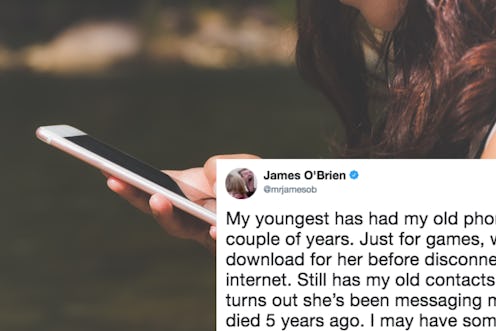Life
This Story About A Girl Who Still Sends Texts To Her Late Grandfather Will Move You
Grief is one of the most complicated emotions someone can experience. The path to accepting the loss of a loved one can be anything but linear, as the concept of death in itself is difficult to grasp — particularly for children. With technology advancing all the time to make aspects of daily life more simple, it has also evolved to provide support in some of the most unexpected ways. A recent tweet by a radio representer in London is the perfect example of such: the picture documents the discovery of his young daughter, who is still sending texts to her late grandfather.
James O'Brien, a radio personality in London, shared the photo. In the accompanying caption, he explains that he gave his daughter one of his old cell phones to use for playing games after he disconnected it from the internet. But the phone, his daughter discovered, retained its contact numbers. Upon discovering this, she proceeded to text her grandfather (James' father) sweet little messages and life updates. Already a beautiful anecdote in itself, the discovery is even more special as James' father passed away five years ago. The Tweet was originally posted on Saturday and has since been retweeted 27,000 and favorited upwards of 146,000 times, respectively.
In addition to the innumerable retweets and favorites the original post has garnered, it has also inspired many users to chime in with similar accounts of using text messages or social media to help process grief. One particular anecdote involves a user recounting how she messaged her daughter every day for two years following her premature death. She recalls how the messages began with despair, and as time passed became more casual chats and included things like family announcements. In a way, being able to message her daughter helped the user normalize, and make peace with an inherently uncomfortable experience.
When one of these "beyond the grave" interactions takes place, they tend captivate readers particularly strongly — particular because for some, they are very relatable, and offer some hope in the idea of someone living in some small way after death.
Just last week, a post on Reddit about a similar experience went viral. On r/twoxchromosomes, user BohoBeagle told the story of her boss' second chance at love after a divorce two decades prior. In a devastating turn of events, the new husband of her boss (whom she refers to as Sarah) suffered a major, fatal heart attack unexpectedly. To make matters worse, it took place the week before Valentine's Day. But when Feb. 14 rolled around, her boss received a flower delivery that her husband had apparently organized before his death. In the accompanying note, he described how lucky he felt to call Sarah his wife. A nice gesture under any circumstance, the significance of this bouquet is far deeper than most.
In the psychology community, death (and how it affects the living) is an ever-present topic. Though dealing with life's most inevitable guarantee is a subjective experience, there's a model known as The Five Stages that is looked upon by most practitioners as the standard for approaching the journey through grief. These stages — denial, anger, bargaining, depression, and ultimately acceptance — are a basic model for describing the ways in which one processes loss.
It is hard to imagine that back in 1969, when Dr. Elisabeth Kübler-Ross first created the Five Stages model, she thought one day decades in the future a young girl in the United Kingdom would be using text messages to come to terms with the death of her grandfather. Or, moreover, that so many other people would relate to her touching naivety.
But in a way it makes sense. With technology swiftly advancing to help people with almost anything, why shouldn't it be able to provide comfort to those dealing with complex emotions? Even if through an unsent text message.
